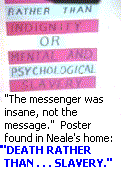|
|
|
MASS MURDER AND THE POSTAL PURGES (PAGE 5)



 On October 6, 1998, in Riverside, California, my home for more than 25 years, a Fontana letter carrier, Joseph L. Neale, Jr., age 49, snapped under the strain of working two jobs to earn a decent living and shot the mayor, two councilmen, and three police officers. Return fire from police wounded a councilwoman and Neale.
On October 6, 1998, in Riverside, California, my home for more than 25 years, a Fontana letter carrier, Joseph L. Neale, Jr., age 49, snapped under the strain of working two jobs to earn a decent living and shot the mayor, two councilmen, and three police officers. Return fire from police wounded a councilwoman and Neale.


